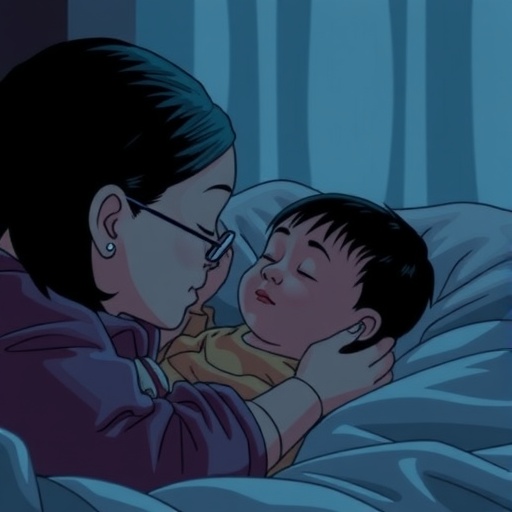Recent research has illuminated an intricate connection between maternal mental health and child development, particularly emphasizing the effects of maternal depression on preschool-aged children. The study conducted by Selman, Gurel, and Dilworth-Bart explores how the mental well-being of mothers directly correlates with attentional and behavioral outcomes in their children. This relationship not only highlights the burdens that maternal depression can impose but also underscores the significant impact of sleep on cognitive and behavioral development in young children.
Maternal depression is a multifaceted issue that can profoundly influence family dynamics and child-rearing practices. The study meticulously examines how symptoms associated with maternal depression can disrupt maternal-child interactions, resulting in adverse developmental outcomes for the child. An overarching theme of the research is the crucial role of sleep, or lack thereof, in moderating these effects. Sleep is integral to cognitive functioning, and any disruption in sleep patterns may lead to challenges in attention, emotional regulation, and behavioral responses in children.
The findings showcase a worrying trend: children of mothers experiencing depression may exhibit an increased prevalence of attentional issues. These attentional deficits can manifest as difficulties in focusing, following instructions, and engaging in age-appropriate activities, thus adversely affecting their academic readiness and social interactions. By highlighting these outcomes, the study calls for greater awareness and support for mothers encountering mental health challenges, as their emotional states can reverberate through their children’s lives in profound ways.
Sleep disturbances are common among depressed mothers, which can exacerbate their mental health issues and ripple through their parenting. Sleep deprivation not only impacts mood regulation but also leads to cognitive impairment, increasing the challenges faced in parenting. The intergenerational transfer of these difficulties has far-reaching implications, compelling a need for interventions that address both maternal mental health and sleep hygiene. Establishing robust sleep routines may serve as an effective strategy to bolster both maternal well-being and child development.
Research has shown that sleep plays a critical role in learning and memory consolidation. For children, adequate sleep is essential not just for physical growth, but for cognitive tasks that demand sustained attention. The study underscores the fact that insufficient sleep deprives preschoolers of crucial developmental experiences that are vital for their growth and learning. These insights call into question the societal and systemic structures surrounding maternal support, particularly in contexts where women are more vulnerable to mental health issues.
The ramifications of this study extend beyond immediate behavioral outcomes. They elicit questions regarding societal norms surrounding motherhood, mental health stigmas, and the undervaluation of maternal sleep needs. The exploration of these themes could spur greater dialogue around creating supportive environments for mothers, ensuring they have the necessary resources to take care of their own mental and physical health.
The implications for policymakers become clear; integrating maternal mental health services into healthcare systems is paramount. Programs that offer support not only for mental health issues but also address sleep hygiene could foster an environment that promotes healthier familial outcomes. Parenting classes emphasizing these dual aspects of care may also serve as an effective preventative measure, ensuring that mothers feel equipped to handle their mental health challenges while fostering positive development in their children.
Furthermore, the study illustrates the necessity for early identification of maternal depression and proactive engagements with mental health professionals. Immediate interventions can mitigate the potentially damaging outcomes on children’s cognitive performances. Offering community support systems, therapies, and sleep interventions could significantly alter the trajectory of familial health.
Another aspect of the research dives into the genetic and environmental factors that influence the prevalence of depression among mothers. Understanding how various influences converge can provide insight into creating targeted interventions that address the specific needs of different populations. This level of tailored support is critical as it moves away from one-size-fits-all approaches, directly recognizing the diverse experiences of mothers in different socio-economic and cultural contexts.
The conversation must extend into educational settings, where educators can play a pivotal role in observing and supporting children who display these attentional deficits. Training for teachers in recognizing signs of trauma or developmental delays can lead to supportive interventions that help children navigate their educational journeys more effectively. This holistic approach is vital, advocating for a network of support that encompasses health, education, and community engagement.
In conclusion, Selman, Gurel, and Dilworth-Bart’s research provides vital insights into the intricate relationship between maternal depression and its effects on child development, asserting the paramount importance of sleep. It encourages an integrative approach to understanding and addressing issues surrounding maternal mental health to cultivate a supportive environment for both mothers and their children, ultimately leading to improved attentional and behavioral outcomes in preschool-aged children.
The study serves as a call to action for greater systemic change in how we perceive and support maternal health. As we move forward, it is crucial to foster narratives that uplift mothers and provide comprehensive support systems that encapsulate mental, physical, and emotional health needs. By prioritizing maternal well-being, we open pathways not only for healthier families but for a future generation equipped to thrive.
Subject of Research: The impact of maternal depression on preschool-aged children, focusing on attentional and behavioral outcomes as influenced by sleep.
Article Title: Sleep Matters: Attentional and Behavioral Outcomes among Preschool Age Children of Mothers with Depression.
Article References:
Selman, S.B., Gurel, B.F. & Dilworth-Bart, J.E. Sleep Matters: Attentional and Behavioral Outcomes among Preschool Age Children of Mothers with Depression.
J Child Fam Stud 34, 2432–2443 (2025). https://doi.org/10.1007/s10826-025-03152-6
Image Credits: AI Generated
DOI: https://doi.org/10.1007/s10826-025-03152-6
Keywords: maternal depression, child development, attentional outcomes, behavioral outcomes, sleep hygiene, early intervention, mental health, preschool age children, supportive environments, community health, policymaking, educator involvement, systemic change.




